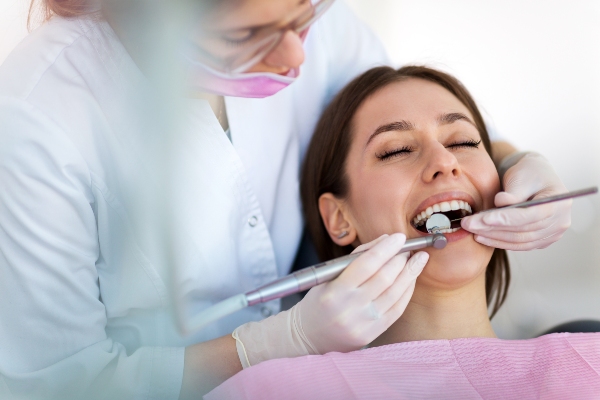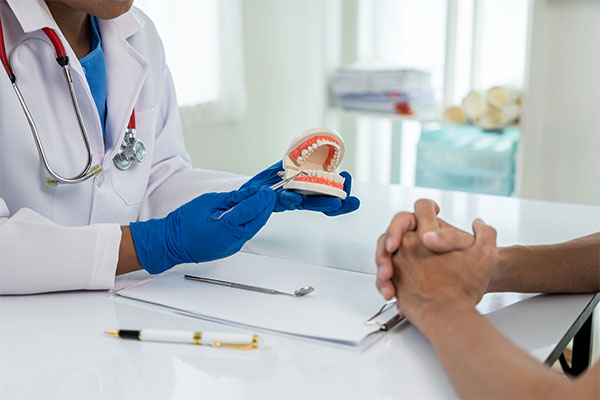 Regular visits to a general dentist are vital in maintaining healthy teeth and gums. General dentists are often primary care providers for dental health. They are specially trained to provide a wide range of services daily to prevent, diagnose, and treat oral health issues. This ensures their patients have healthy, functional, and beautiful smiles. The following guide will review five of the most common our general dentists perform regularly.
Regular visits to a general dentist are vital in maintaining healthy teeth and gums. General dentists are often primary care providers for dental health. They are specially trained to provide a wide range of services daily to prevent, diagnose, and treat oral health issues. This ensures their patients have healthy, functional, and beautiful smiles. The following guide will review five of the most common our general dentists perform regularly.
5 Treatments at a general dentist
1. Complete exams
According to the American Dental Association (ADA), patients should strive to maintain a biannual dental exam schedule. A complete dental exam is an essential part of anyone's oral health. It is a comprehensive assessment that includes X-rays and the general dentist checking for signs of cavities, gum disease, and infections. They will also check for the overall health of the patient's gums and teeth and the risk of developing other problems in the future, like oral cancer, malocclusions, heart disease, and even diabetes.
2. Fillings
The general dentist will use dental fillings to repair damaged teeth, usually due to decay. Dental fillings can consist of porcelain, composite (tooth-colored), or gold materials.
The dentist will administer a local anesthetic to ensure the patient is numb yet alert during the procedure. After numbing, they will use a laser or hand tool to clean away decay and damage to the tooth. They will then use an acid-style gel to remove any lingering bacteria before filling the hole with the chosen material.
3. Crowns
A dental crown is a restoration option for the entire tooth, including its root structure and surrounding tissue. Crowns can consist of different materials: gold alloy, porcelain fused to metal, porcelain, and plastic resins such as acrylic or composite.
The dentist will remove any decay from the affected area and take impressions of the remaining tooth structure. Since the crown is specially made, the impressions help ensure the it will provide a natural fit and look when smiling and in use. Next, the dentist will fit the patient with a temporary crown while their permanent crown is crafted at an offsite dental lab. Once the dentist receives the crown, it will fit onto the patient's tooth like a puzzle piece.
4. Extractions
Extractions are the removal of teeth. General dentists often perform this procedure for a variety of reasons:
- To prevent more damage to surrounding teeth or jawbone.
- To remove damaged or diseased tissue that cannot be repaired.
- To make room for dental implants or other restorations, such as crowns and bridges.
A general dentist can perform an extraction in one visit with a local anesthetic to ensure the patient can drive home after the appointment. First, they will numb the surrounding gums with a topical anesthetic, then inject the local anesthetic to numb the jawbone during the procedure. Once completely numb, the dentist will use forceps and elevators to lift the tooth from its socket safely. If the tooth is stubborn and deeply rooted, the dentist may use other dental instruments to remove it.
5. Root canal therapy
If a tooth is damaged due to decay or trauma, this can cause an infection in the soft tissue inside the tooth called the pulp or pulp chamber. If left untreated, this infection will worsen. It could eventually spread to other areas of the mouth and body, leading to serious health conditions such as an abscess or sepsis.
Root canal therapy is a procedure that involves removing and cleaning infected tissue from inside the tooth. Root canal therapy aims to save the patient's natural teeth by preventing infection from fully compromising the tooth and spreading to other parts of the mouth.
Let us be your new dental home
Our general dentist provides many services, including some not mentioned above. If you are looking for a new dental home or have concerns about your oral health, contact us today. Our team is happy to answer any questions about our general dentistry services.
Request an appointment or call Chesterfield Dentist at 804-412-0867 for an appointment in our Chester office.
Recent Posts
Finding the right dentist for your oral health needs can be difficult. Many questions may come to mind, such as whether a general dentist or a family dentist is the right choice. In this blog, we will discuss the differences between general and family dentists, helping to give you a better understanding of when to…
Bad breath can feel uncomfortable and embarrassing, even more so when it does not seem to go away. If you are struggling with chronic bad breath, a general dentist can help. Many treatment options are available, some of which take place at home. In this article, we will explore the common causes of bad breath…
It is natural for teeth to discolor over time. If you have noticed that your smile has lost its luster, a general dentist can help. For effective and long-lasting results, get personalized advice and treatment from the dentist in-office. However, there are general steps you can take to improve the whiteness of your smile. Below…


